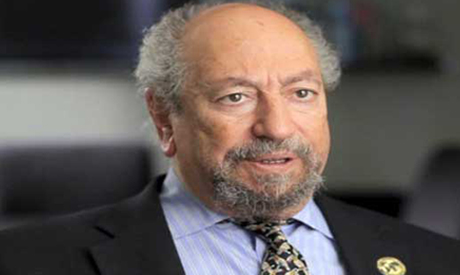Two leaders of the Ibn Khaldun rights centre have been at loggerheads over conflicting positions towards Egypt's new authorities

Saad Eldin Ibrahim
A simmering disagreement over support for Egypt's new authorities has caused a rift in one of Egypt's oldest rights groups and ended with the resignation of one of its leading members.
Dalia Zeyada of the Ibn Khaldun Centre for Development Studies, a civil rights group, said a conflict of ideologies between her and the centre's head, Saad El-Din Ibrahim – a prominent rights advocate and sociologist –forced her to break away from the group.
The fuse was lit by a recent article Ibrahim wrote in privately-owned Al-Masry Al-Youm newspaper, in which he slammed local media for its portrayal of civil society groups as traitors serving foreign agendas.
In his piece, Ibrahim denounced foreign funding to non-governmental organizations as treason, and wondered if President Abdel-Fattah El-Sisi as the head of the state should thus be held accountable for receiving funds, loans and aid from foreign countries.
He also criticised Zeyada for taking part in an Egyptian delegation that defended the country's censured human rights record against western and regional critics at a United Nations hearing in Geneva earlier in November.
"He believes civil society should play a critical role, while I think we have to back the state at this critical time, particularly before the international community," Zeyada told Ahram Online.
According to the outgoing director, both rights campaigners have been at odds over backing Egypt's authorities following the ouster of Islamist president Mohamed Morsi last year and the crackdown on his supporters. A campaign she launched in August 2013 to label the Brotherhood a terrorist group was another reason for dispute.
Ibrahim was not immediately available to comment.
Describing the recent article as "the final straw," Zeyada said she was incensed by Ibrahim's criticism of the government and his accusation that authorities enlisted her help to polish the country's image in the west.
"It's no shame that you stand by your country," she remarked.
A visit by Ibrahem to Qatar, which fell out with Egypt over its backing to the Brotherhood, in March as well as his appearance on the Qatari-owned Al-Jazeera channel, have contributed to the row.
Zeyada said at the time of the visit, in which Ibrahem proposed an initiative to ease tensions between both states, was an individual move that does not represent the center.
"Our statements have been conflicting for a long time, so i think it's time to leave," She said
Founded in 1988, Ibn Khaldun is the one of the Middle East's oldest and biggest rights center, specialized in human rights and general freedoms researches.
It was chosen amongst the best think tanks in a 2013 rankings by the University of Pennsylvania.
Zeyada stated she would announce this week the creation of an idependant centere that "studies the democratic transition in Egypt and combat terrorism," with local and international activities.

Saad Eldin Ibrahim
A simmering disagreement over support for Egypt's new authorities has caused a rift in one of Egypt's oldest rights groups and ended with the resignation of one of its leading members.
Dalia Zeyada of the Ibn Khaldun Centre for Development Studies, a civil rights group, said a conflict of ideologies between her and the centre's head, Saad El-Din Ibrahim – a prominent rights advocate and sociologist –forced her to break away from the group.
The fuse was lit by a recent article Ibrahim wrote in privately-owned Al-Masry Al-Youm newspaper, in which he slammed local media for its portrayal of civil society groups as traitors serving foreign agendas.
In his piece, Ibrahim denounced foreign funding to non-governmental organizations as treason, and wondered if President Abdel-Fattah El-Sisi as the head of the state should thus be held accountable for receiving funds, loans and aid from foreign countries.
He also criticised Zeyada for taking part in an Egyptian delegation that defended the country's censured human rights record against western and regional critics at a United Nations hearing in Geneva earlier in November.
"He believes civil society should play a critical role, while I think we have to back the state at this critical time, particularly before the international community," Zeyada told Ahram Online.
According to the outgoing director, both rights campaigners have been at odds over backing Egypt's authorities following the ouster of Islamist president Mohamed Morsi last year and the crackdown on his supporters. A campaign she launched in August 2013 to label the Brotherhood a terrorist group was another reason for dispute.
Ibrahim was not immediately available to comment.
Describing the recent article as "the final straw," Zeyada said she was incensed by Ibrahim's criticism of the government and his accusation that authorities enlisted her help to polish the country's image in the west.
"It's no shame that you stand by your country," she remarked.
A visit by Ibrahem to Qatar, which fell out with Egypt over its backing to the Brotherhood, in March as well as his appearance on the Qatari-owned Al-Jazeera channel, have contributed to the row.
Zeyada said at the time of the visit, in which Ibrahem proposed an initiative to ease tensions between both states, was an individual move that does not represent the center.
"Our statements have been conflicting for a long time, so i think it's time to leave," She said
Founded in 1988, Ibn Khaldun is the one of the Middle East's oldest and biggest rights center, specialized in human rights and general freedoms researches.
It was chosen amongst the best think tanks in a 2013 rankings by the University of Pennsylvania.
Zeyada stated she would announce this week the creation of an idependant centere that "studies the democratic transition in Egypt and combat terrorism," with local and international activities.

No comments:
Post a Comment
Note: Only a member of this blog may post a comment.